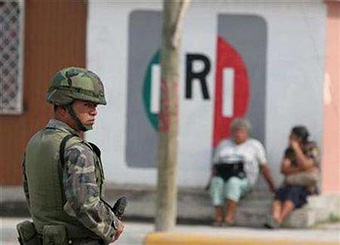
|
 |
 |
 News Around the Republic of Mexico | February 2008 News Around the Republic of Mexico | February 2008  
Mexico's Calderon to Reduce Army Role In Drug War
 Mica Rosenberg - Reuters Mica Rosenberg - Reuters
go to original


| | A Mexican soldier stands guard at a military checkpoint in the bordertown of Rio Bravo in the state of Tamaulipas, December 6, 2007. Mexican President Felipe Calderon said on Wednesday he wants to phase out the army's role in fighting drug traffickers as the country works to reform its notoriously corrupt police forces. (Reuters/Tomas Bravo) | | |
Mexico City - Mexican President Felipe Calderon said on Wednesday he wants to phase out the army's role in fighting drug traffickers as the country works to reform its notoriously corrupt police forces.

"We must clean up and strengthen the police forces across the country so that the participation of the army in the fight against crime will become less and less necessary," Calderon said at an event with Louise Arbour, the U.N. High Commissioner for Human rights.

Calderon has mobilized some 25,000 Mexican troops since taking office in December 2006 to try to crush powerful drug cartels that are warring over lucrative smuggling routes to the United States.

Arbour, who is in Mexico on a visit to review Mexico's human rights record, on Tuesday criticized Calderon's military campaign against drug traffickers as dangerous and warned that military forces should not be taking on civilian roles.

Calderon said he planned on phasing out the army's role in the drug fight.

"As civilian institutions increase their capacity to fight crime, army participation will become more sporadic," said Calderon.

The Mexican president has won praise at home and in Washington for using the military, as corrupt police forces side with drug gangs, especially in states bordering the United States.

But Calderon has faced criticism from rights groups who say sometimes heavy-handed soldiers have committed abuses. A Mexican court last year sentenced at least four soldiers to up to 40 years in prison for rape in 2006.

More than 2,500 people were killed in Mexico in drug violence in 2007 amid a drive by an alliance of cartels headed by Joaquin "Shorty" Gunman - Mexico's most wanted man - to dominate the Mexican drug trade against rivals.

On Wednesday, one soldier was killed in a shootout with drug hit men in Calderon's home state of Michoacan.

"I am convinced that in Mexico the biggest threat to human rights comes from organized crime, whose actions have claimed the innocent lives of journalists, judges, police, soldiers and sailors killed just for doing their duty," he said.

(Editing by Alistair Bell and Eric Walsh) | 
 | |
 |



